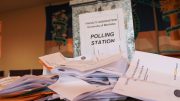Right now, most U of M students aren’t too concerned with exams. Having just returned from winter break, for most of us the next major tests won’t start for at least another few weeks. But right now, across Manitoba, tens of thousands of grade 12 students are in the middle of exams, and this year it seems that the “standardised” tests are anything but standard.
Of the roughly 7,000 students who recently wrote this term’s grade 12 English language arts exam, an undetermined number had access to the theme of the exam, which was environmental issues, several weeks prior to the first exam day. Contrary to intuition, they did not find out by stealing a paper or any such nefarious means. No, they simply were told the topic — by their teacher.
I am given to understand that the proper procedure for handling the exam is for the English department head to keep the papers sealed and in their custody until the date it will be written. According to protocol, the teacher in question shouldn’t have been able to open them until they began preparing the materials that morning.
After the teacher leaked the topic to his class, several students promptly posted it on Facebook.com, and the situation quickly got even more out of hand. Some students and parents worried that they would have to re-write the exam, or that their exam grades would not be counted towards their final mark. On Internet comment sites and at the water cooler, people expressed frustration with the educational system, and there was a profound sense that an injustice had been done.
I’d like to point out something about Manitoba’s educational system. The system, and the people who run it, including the teachers, support staff, administrators and all others, hold the honest and sincere goal of helping students succeed. I submit that the most powerful force in the universe is not compound interest as Einstein would have it, not the hydrogen bomb or the Vatican, and most definitely not political clout. No, the most powerful force is education. But formal education doesn’t necessarily limit its benefits to teaching the Monty Hall problem or the first law of thermodynamics, or even Julius Caesar. Some of the most valuable teachings of our grand education system are far more subtle. For example, I’d never taken a logical thinking course in K-12, but my pre-calculus courses certainly helped hone this skill. My ability to speak extemporaneously was no doubt greatly enhanced by reading the works of remarkable writers and thinkers such as Shakespeare, Orwell and Tolstoy. And I doubt I would have as complete an understanding of Canada as a nation had I not spent the time I have reading Ondaatje and Atwood.
But perhaps most important of all, from my high school experience I learned a great deal about morality and ethics. Public schooling is, in my experience, one of the few places where the only absolute, the only truth to be accepted without question, is: question everything, and make up your own mind. In university, in various fields of employment, in politics and beyond, inculcation is often looked at as a wonderful tool. In high school, I was encouraged to think for myself, to exercise my potential, to develop my own views and (gasp!) to question the teachers and administrators.
The actions of this teacher, regardless of his motivations, have undermined the most valuable lesson that the school system has to offer. If this breach in trust had occurred two years ago during the exam I wrote, I would have been extremely upset and I would have felt cheated. I don’t think a short suspension would be sufficient; the teacher should face severe disciplinary action, and all options should be considered, including termination of employment.
Teachers are in a position of trust. They hold the responsibility of guiding youth through very turbulent years. If even the teachers are cheating, how can we fairly expect students to understand the value of education?
Mikhail Kolybaba is a second-year engineering student who holds a strong belief in the merits of education.



